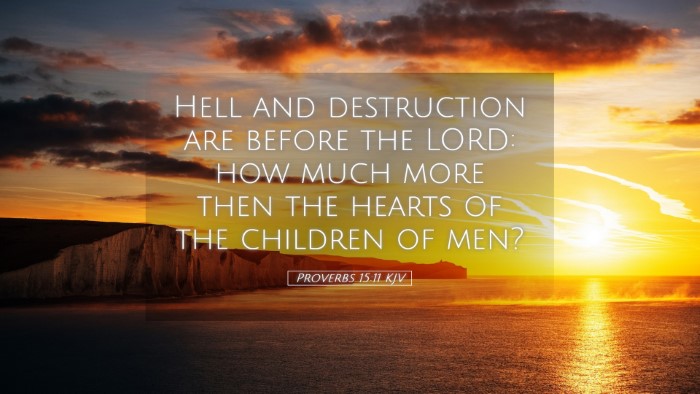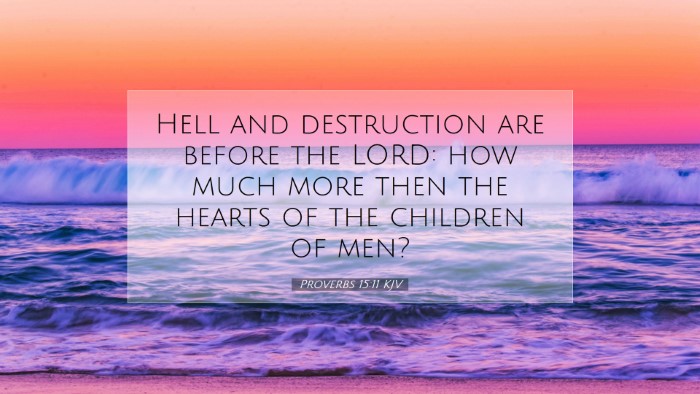Commentary on Proverbs 15:11
Proverbs 15:11 states: "Hell and destruction are before the LORD: how much more the hearts of the children of men?" This verse serves as a profound reminder of God's omnipresence and His deep knowledge of the human condition. Various public domain commentaries offer insights into this passage, exploring its theological, moral, and practical implications.
1. Contextual Understanding
Before diving into the verse, it is essential to understand its context within the Book of Proverbs. This book is traditionally attributed to Solomon and is filled with wisdom literature that offers practical guidance for living a godly life.
1.1 The Nature of Proverbs
Proverbs is characterized by its pithy statements and poetic form, combining elements of philosophy with moral instruction. In this context, Proverbs 15:11 stands out as a stark reminder of the divine perspective on human integrity and moral accountability.
2. Insights from Commentators
2.1 Matthew Henry’s Perspective
Matthew Henry reflects on the omniscience of God as portrayed in this verse. He emphasizes that if the depths of the grave and the eternal consequences of sin are visible to God, then surely He is aware of the innermost thoughts and intentions of humanity. This highlights the idea that nothing is hidden from God:
- Divine Awareness: God comprehends all—to Him, hell and destruction are not mere abstractions but realities that bear weight in His divine will.
- Human Accountability: Henry suggests that human hearts are laid bare before God, which necessitates a life of honesty and integrity.
2.2 Albert Barnes’ Insights
Albert Barnes elaborates on the implications of this verse concerning human judgment and moral behavior. He points out:
- God’s Sovereignty: The verse asserts that God sees the ultimate consequences of sin (i.e., hell and destruction), thus underscoring His authority in judging the deeds of men.
- The Depth of Human Sin: Barnes stresses that the human heart is prone to sin and deceit, making it imperative for individuals to seek God’s guidance and wisdom to navigate moral choices.
2.3 Adam Clarke’s Interpretation
Adam Clarke offers a thorough examination of the contrast between the visible realities of hell and destruction and the hidden nature of human motivations. His commentary includes:
- Invisible yet Perceptible: Clarke highlights that while the physical manifestations of sin (like hell) are often visible, the intentions behind actions—found in the hearts of men—require divine insight to discern.
- Call to Reflection: He encourages readers to reflect on their inner thoughts and motives, aligning them with God’s will to avoid spiritual destruction.
3. Theological Implications
This verse deeply touches on key theological concepts such as the nature of sin, judgment, and grace.
3.1 Sin and Its Consequences
The acknowledgment of hell and destruction informs us about the reality of sin's consequences. It serves as a solemn reminder of God's wrath against unrepentant hearts.
3.2 The Nature of God
The verse reveals God's omniscience, which is a central tenet of Christian theology. God’s knowledge encompasses all aspects of existence, including the human heart's thoughts and desires.
3.3 Call to Integrity
Understanding that the Lord sees into the depths of our hearts should compel believers to seek lives marked by integrity, purity, and a heart turned toward God.
4. Practical Applications
As we reflect on Proverbs 15:11, we can find several practical applications for pastors, students, and scholars alike:
- Self-Examination: Regularly meditate on the condition of one’s heart, seeking the Lord’s guidance and redemption from sin.
- Preaching Integrity: Pastors should emphasize the importance of inner purity and the need for a genuine relationship with God in their teachings.
- Wisdom in Counsel: The acknowledgment of God’s insight should guide how counsel is given to others, encouraging openness and honesty.
5. Conclusion
Proverbs 15:11 serves as a poignant reminder of the relationship between divine knowledge and human accountability. By drawing on the insights of Matthew Henry, Albert Barnes, and Adam Clarke, we see the multifaceted implications of this verse. It invites believers to embrace transparency before God, live with integrity, and understand the gravity of sin within the context of divine judgment. Ultimately, this passage calls for a courageous pursuit of holiness in light of the omniscient gaze of our Creator.


